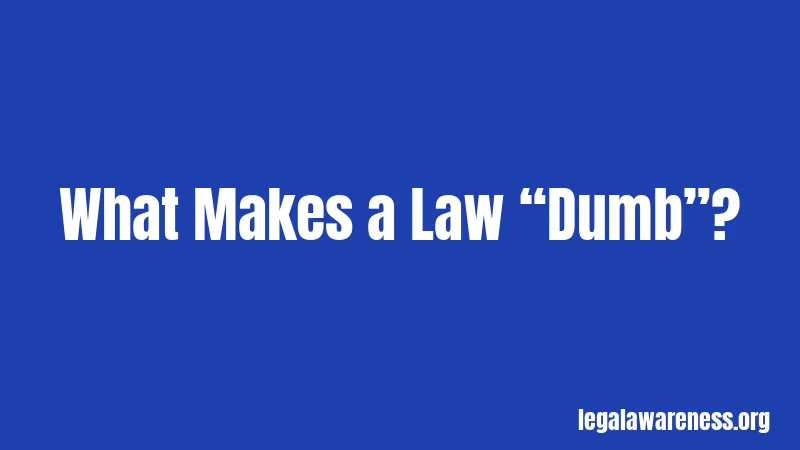Dumb Laws in Texas (2026): Strange Rules Still on the Books
Ever heard someone say Texas does things differently? Well, they’re not kidding. The Lone Star State has some seriously weird laws still sitting in the books. Some make you laugh. Others make you scratch your head. A few might even land you in trouble if you’re not careful.
Let’s dive into the strangest laws Texas has to offer. Trust me, you’re gonna love this one.
What Makes a Law “Dumb”?

Here’s the thing. Most of these laws made perfect sense when they were written. Maybe ranchers were fighting over land. Maybe towns needed to stop people from spitting everywhere. The world was different back then.
But times change. Technology advances. Society moves forward. Yet these laws? They stick around like that one song you can’t get out of your head.
Some are just outdated. Others were probably questionable from the start. Either way, they’re real, they’re enforceable, and they’re definitely entertaining.
You Can’t Sell Your Organs (But Hair Is Fine)
Okay, this one actually makes sense. Sort of.
Under Texas Penal Code Section 48.02, selling human organs is illegal. We’re talking eyes, kidneys, liver, heart, lungs, and skin. It’s a Class A misdemeanor with up to a year in jail and fines up to $4,000.
But here’s where it gets weird. You can totally sell your blood and hair. Yep, that’s allowed.
So if you need some quick cash, hit up the plasma donation center. Just don’t try selling a kidney on the side. Pretty straightforward, right?
This law exists to prevent people from being exploited. Makes sense when you think about it. Still kinda funny that they had to spell it out.
Milking Someone Else’s Cow Is Theft

Wait, what?
In the old days, unauthorized milking was its own specific offense, reflecting just how valuable livestock once was. We’re talking mid-1800s Texas here. Cattle were everything. Every drop of milk mattered.
Today, milking someone else’s cow without permission is categorized as theft of personal property. The standalone law got updated, but the concept stuck around.
Honestly, this is the part most people miss. You might think it’s just milk. But legally? It’s stealing. And yes, you can still get in trouble for it.
Not planning on milking your neighbor’s cow anytime soon? Good call.
Windshield Wipers Required, Windshield Optional
Hold on, this part is important.
Texas requires windshield wipers on all vehicles—even if they have no windshield. Read that again. You need wipers. The actual windshield? Totally optional.
This creates what lawyers call a “compliance quirk.” Normal people call it nonsense.
Think about it. You could legally drive around in a car with no windshield. But you better have those wipers installed somewhere. Where would they even go? The dashboard? The hood?
The law doesn’t explain. Nobody seems to know. But it’s still on the books.
Train Crossing Standoff: The Impossible Law

This one’s my favorite. Seriously.
According to old Texas law, when two trains meet at an intersection, both must stop and neither can move until the other has cleared. Let me break this down.
Train A arrives. It stops. Train B arrives. It stops. Now what?
Neither train can move until the other one leaves. But neither train can leave until the other one moves. See the problem?
This law creates a logical impossibility. It’s like a real-life paradox. And somehow, lawmakers approved it.
To be fair, this probably made more sense in context we don’t have anymore. Maybe it was written for different types of crossings. Maybe someone just messed up the wording. We’ll never know.
Sitting on Sidewalks in Galveston Costs $500
Not sure what counts as a violation? Let me break it down.
In Galveston, sitting on the sidewalk can result in a $500 fine. This isn’t a myth. It’s actually enforceable. The city wants to keep pedestrian areas clear.
Five hundred bucks for sitting down. That’s more than some traffic tickets.
The law exists for crowd control and public safety. Galveston gets tons of tourists. Crowded sidewalks become safety hazards. Still, $500 seems pretty steep for taking a quick rest.
Just find a bench instead. Your wallet will thank you.
Common Law Marriage: Three Announcements and You’re Hitched
Wondering if this applies to you? Here’s what you need to know.
Texas recognizes marriage without formalities, also called common law marriage. It’s one of only seven states (plus D.C.) that still does this.
The requirements are simple. The parties must be 18 or older, willing participants, and unrelated. Then you need to agree to be married, live together, and publicly represent yourselves as married.
Some people think you just announce it three times and boom, married. It’s actually more complex than that. You need genuine intent and consistent behavior.
This law has real consequences. It affects inheritance, wrongful death claims, and divorce proceedings. Don’t joke around about being married. Texas might take you seriously.
No Liquor Sales on Sunday (Blue Laws Live On)
You’re not alone, this confuses a lot of people.
Texas still enforces some blue laws, including liquor stores being closed on Sundays. These are old morality laws from way back when.
Beer and wine? You can buy those on Sunday at grocery stores. But liquor? Nope. You gotta wait until Monday.
Car dealerships must also close one day on the weekend. They pick either Saturday or Sunday, but they can’t stay open both days.
Most Texans don’t even question these rules anymore. They’re just part of life here. But they’re definitely outdated remnants from a different era.
Wire Cutters in Austin: A Rancher’s Feud
Here’s where things get historical.
In Austin, carrying wire cutters in your pocket was historically prohibited under local ordinances. Why? Range wars.
Back in the day, ranchers fought over open land versus fenced property. Instead of deciding who was right, lawmakers took a more indirect approach: limiting access to the tools most often used to cut fences.
Couldn’t cut your neighbor’s fence if you didn’t have wire cutters, right? Problem solved. Kinda.
Modern enforcement focuses more on intent now. If you’re carrying wire cutters for theft or vandalism, that’s different than having them for legitimate work. But the historical ban remains a fascinating look at how Texas dealt with neighbor disputes.
Port Arthur: No Obnoxious Odors Allowed
Okay… this one’s important.
Port Arthur law prohibits releasing obnoxious odors. This includes elevators, public spaces, pretty much anywhere.
The law addresses what’s called “effluvia.” That’s fancy talk for harmful or unpleasant discharges and odors. It covers things like maintaining privies, cesspools, failure to connect to sewers, putrid meats, or decaying vegetables.
Is this about protecting the environment? Mostly yes. But it’s also about not making elevators unbearable for everyone else.
While rarely enforced for, you know, natural bodily functions, it’s technically still on the books. Just something to keep in mind in Port Arthur.
Paying a Traffic Ticket Admits Guilt
Sound complicated? It’s actually not.
In Texas, paying a traffic fine is an admission of guilt. This isn’t just a weird quirk. It has serious implications.
If you get in an accident later, that paid ticket can be used against you. Insurance companies love this. They’ll use it to assign more fault to you. That means higher rates or reduced settlements.
You have three options when you get a ticket. Pay it and plead guilty. Fight it and go to trial. Request a driving safety course. There’s also “no contest,” where you don’t deny the charges but still pay a fine.
Most people just pay and move on. But that’s basically saying “yep, I did it.” Think carefully before you pay, especially if there might be injury claims involved.
Barefoot in Public: The Permit Myth
Don’t worry, we’ll break it down step by step.
The idea that Texas cities require a $5 permit to walk barefoot is a persistent myth. It’s everywhere online. People repeat it constantly. But it’s not actually true.
No such law exists currently. Not in Austin. Not in Houston. Nowhere in Texas.
This is one of those urban legends that just won’t die. Maybe it existed somewhere at some point. Maybe someone made it up as a joke. Either way, you can walk barefoot without a permit.
That said, private businesses can still refuse service if you’re not wearing shoes. That’s their right. But the government won’t fine you.
Encyclopedia Britannica: The Beer Recipe Ban
This one’s probably the most bizarre.
Supposedly, Texas outlawed the entire Encyclopedia Britannica because it contains a formula for making beer at home. Lawmakers didn’t want people creating home breweries.
Think of it like censorship, but for reference books.
The thing is, this law’s existence is hard to confirm. Multiple sources mention it. Nobody can point to the actual statute. It might be true. It might be another urban legend.
Either way, the idea that you could face fines and jail time for owning an encyclopedia is absolutely wild. Less severe than other crimes, but still pretty ridiculous.
Three Sips of Beer While Standing
Here’s the deal.
In LeFors (a tiny Panhandle town), there’s allegedly a law against taking more than three sips of beer while standing. With a population of about 500 and no online municipal codes, this urban legend spread across the state.
But here’s the truth. There does not seem to be a basis for it.
LeFors is so small that nobody can find their actual city codes online. So this law might exist. Or it might be complete fiction. Nobody knows for sure.
The story’s too good not to repeat though. And honestly? It sounds exactly like something a small Texas town might have done a hundred years ago.
What About the Buffalo Law?
Literally everyone asks about this one.
The famous law against shooting buffalo from a second-story hotel window? Pure myth. No such Texas statute exists.
This gets repeated constantly. It sounds believable. Texas had buffalo. Hotels had second floors. But nobody can find the actual law.
Discharging a firearm from a balcony would violate multiple modern laws anyway. So you definitely can’t do it. There just isn’t a specific buffalo-related statute.
It’s still funny to imagine though. What situation led to that being necessary? Were people actually shooting buffalo from hotels? We’ll never know because it never happened.
The Crime Notice Law That Never Was
Most people don’t realize how strict these laws actually are.
Here’s another myth. The claim that criminals must notify victims 24 hours in advance? False. A 1973 bill tried to introduce this, but it never passed.
Can you imagine? “Dear homeowner, planning to rob you Tuesday night. Please leave the back door unlocked. Thanks!”
Someone actually proposed this. They thought it would reduce crime. Because criminals wouldn’t want to break this law. Even though they were already planning to break other laws.
The legislature wisely rejected it. But the story lives on as one of the dumbest ideas that almost became law.
Mesquite Haircut Ordinance: Fiction
You might have heard about this. Let me set the record straight.
No law in Mesquite currently bans “bizarre” haircuts for children. This is likely an exaggerated rumor or old school policy.
Could you imagine? Sending a kid to jail because their mohawk was too tall? Or their bangs were cut unevenly?
This one gets repeated a lot. It sounds Texas enough to be believable. But it’s not real. Your kids can have whatever weird haircuts they want.
That doesn’t mean schools won’t have dress codes. But the city government isn’t enforcing haircut laws.
Can These Laws Actually Be Enforced?
Now, here’s where things get serious.
Technically? Yes. Many of these laws are still active. That means police could enforce them. Courts could uphold them. You could actually face fines or even jail time.
Realistically? Most won’t ever be enforced. Nobody’s checking for barefoot permits that don’t exist. No cop is writing tickets for sitting on Galveston sidewalks (though they could).
But some do get enforced. The organ selling law? Absolutely. Common law marriage? All the time. Blue laws about Sunday liquor sales? Every single week.
The weird ones make great conversation. The real ones have actual consequences. Know the difference.
Why Don’t They Just Repeal These Laws?
You’re not alone, this confuses a lot of people.
Repealing laws takes time and effort. Legislators have to write bills. Those bills need votes. The governor has to sign them. It’s a whole process.
And honestly? Most lawmakers have bigger priorities. They’re dealing with schools, roads, healthcare, budgets. Removing a law about train crossings or Encyclopedia Britannicas just isn’t urgent.
Plus, some people like keeping the weird laws around. They’re part of Texas character. They make good stories. They remind us where we came from.
So the dumb laws stick around. Maybe forever.
What Should You Actually Worry About?
Here’s what you need to do.
Focus on the laws that actually get enforced. Don’t sell organs. Don’t milk other people’s cows. Remember that paying traffic tickets admits guilt. Know that liquor stores close on Sundays.
The rest? They’re mostly for entertainment. Good stories to tell at parties. Fun facts to share with out-of-state friends.
But never assume a law is too dumb to be enforced. Texas has surprised people before. Better safe than sorry.
If you’re genuinely concerned about whether something’s legal, ask a lawyer. Don’t rely on internet lists (yes, including this one). Get real legal advice from a real attorney.
The Intersection of Old Laws and New Technology
Wait, it gets better.
As technology advances, old laws create new problems. Remember the windshield wiper law? What about self-driving cars? Do they need wipers if they have no windshields?
Common law marriage gets messy with social media. Is posting “my wife” on Facebook enough? What about Instagram? TikTok?
And those blue laws about Sunday sales? Online shopping completely ignores them. You can order liquor for delivery on Sunday in many places now.
Texas lawmakers are slowly updating things. The 88th Legislature in 2023 passed over 1,095 laws, with hundreds taking effect in September 2024 and January 2025. But they can’t address everything.
Old laws meet new situations. Sometimes it works. Sometimes it creates bizarre loopholes. Always it makes things interesting.
How These Laws Actually Affect Real Cases
Okay, pause. Read this carefully.
Lawyers use these obscure laws in court cases. That’s right. Those dumb laws can become evidence in injury claims or lawsuits.
An old city code could help prove a business or property owner was negligent. Maybe someone got hurt because a business violated some forgotten ordinance about maintenance or safety.
The cow milking law? It’s been used in property theft cases. The common law marriage rules? They determine inheritance and medical decision rights.
Even myths can matter. If enough people believe a law exists, they might change their behavior based on it. That creates patterns lawyers can exploit.
This is why legal experts sometimes have to fact-check these weird laws. Some are myths. Some are real but unenforced. Some are actively used in court. Knowing which is which matters.
Texas Laws vs Other States
Here’s a fun comparison.
Texas isn’t alone in having weird laws. Most states do. But Texas seems to have more that people actually talk about.
Maybe it’s the Texas attitude. Maybe it’s the state’s unique history. Maybe Texans just like telling stories about how different they are.
Other states have their own oddities. But can they compete with train crossing paradoxes and Encyclopedia Britannica bans? Probably not.
It’s part of what makes Texas, well, Texas. For better or worse.
Frequently Asked Questions
Can you really get married by announcing it three times in Texas?
Not exactly. Texas recognizes informal marriage, which requires mutual agreement, living together, and publicly representing yourselves as married. Simply announcing it isn’t enough. You need genuine intent and consistent behavior over time.
Is the Encyclopedia Britannica really banned in Texas?
This one’s unclear. Multiple sources mention it, but nobody can find the actual statute. It might be real, might be an urban legend. Either way, you probably won’t get arrested for owning one.
Do you need a permit to walk barefoot in Texas?
Nope. This is a persistent myth with no basis in current Texas law. Walk barefoot all you want. Just don’t be surprised if businesses refuse you service.
What happens if I pay a traffic ticket in Texas?
Paying a traffic fine is an admission of guilt. This can hurt you later if you’re involved in an accident and need to file an insurance claim or lawsuit. Think carefully before paying.
Are Sunday blue laws still enforced?
Yes. Liquor stores remain closed on Sundays, and car dealerships must close one day each weekend. These laws are actively enforced and most Texans have just accepted them as normal.
Can I actually get fined for sitting on a sidewalk in Galveston?
Technically yes. The fine is $500 and the law is enforceable. It’s rarely enforced for casual sitting, but the city has the authority to ticket you if they choose.
Final Thoughts
Now you know the basics. Texas has weird laws. Some are real, some are myths, all are entertaining.
The truly strange thing? Many of these laws made perfect sense when written. They solved real problems for real people. Times changed but the laws didn’t.
Stay informed about the laws that actually affect you. Laugh at the absurd ones. And remember, just because a law seems too dumb to be real doesn’t mean it isn’t.
When in doubt, ask a lawyer. And maybe avoid milking your neighbor’s cow. Just to be safe.
References
- Texas Penal Code Section 48.02 – https://statutes.capitol.texas.gov/Docs/PE/htm/PE.48.htm
- Legal Urban Legends and Strange Texas Laws – https://www.cobywootenlaw.com/legal-urban-legends-and-strange-texas-laws/
- 15 Strange Enforceable Laws Still on the Books in Texas – https://www.hg.org/legal-articles/15-strange-enforceable-laws-still-on-the-books-in-texas-54411
- 10 Weird Texas Laws Still on the Books (2024) – https://www.attorneystevelee.com/blog/texas/strange-laws/
- 8 Weird (and Real) Texas Laws That Will Make You Do a Double Take – https://www.police1.com/entertainment/8-weird-and-real-texas-laws-that-will-make-you-do-a-double-take
